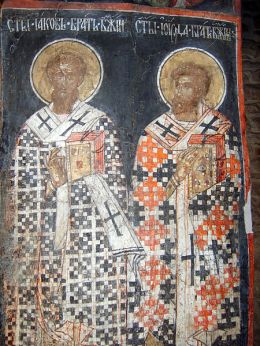 Butler’s final remarks regarding Ss Peter and Paul are: ‘Impulsive, generous Peter and moody, introverted Paul make an odd pair; but their work was complementary, which is why the Church has remembered them together through the centuries.’
Butler’s final remarks regarding Ss Peter and Paul are: ‘Impulsive, generous Peter and moody, introverted Paul make an odd pair; but their work was complementary, which is why the Church has remembered them together through the centuries.’
Their differences in personality and background make it hard to imagine how the two would have got on if they’d worked in close proximity. I’m not sure for example, that had they worked together as fishermen, theirs would have been the most harmonious boat on the sea. As it happened, they had the whole of the Mediterranean world to move around and barely ever met.
But they did meet. For the Office of Readings today, we have a chunk from St Paul’s letter to the Galatians, where Paul sets out in black and white what occurred when he and Barnabas met with Peter, James and John in Jerusalem. Paul is at pains to point out that ‘These leaders had nothing to add to the Good News as I preach it. On the contrary, they recognised that I had been commissioned to preach the Good News to the uncircumcised just as Peter had been commissioned to preach it to the circumcised.’ They all shook hand’s a sign of partnership and it seems all the business is conducted. I imagine all are thinking, ‘Gosh, that went well. They are jolly good chaps. The Church is in safe hands indeed…’ and then, as Paul and Barnabas turn to go, Peter calls out,
‘Just one thing, Paul, that we really must insist on…’
Imagine Paul and Barnabas freezing on the threshold – what could it be? Not circumcision, as that’s all cleared up and everything else has been covered, surely?
‘Remember to help the poor.’
An awful lot of ink has been used to comment on this meeting of Peter and Paul (with even more spilt over the next chapter…) but it’s telling that after what some call ‘the first Council’, the statement that is left ringing in the air is not some intricacy of theology but a most practical point of Christianity: Remember to help the poor (Gal 2:10).
 Lord, give our bodies restful sleep
And let the work we have done today
Be sown for an eternal harvest.
We make our prayer through Christ our Lord,
Amen.
Lord, give our bodies restful sleep
And let the work we have done today
Be sown for an eternal harvest.
We make our prayer through Christ our Lord,
Amen.